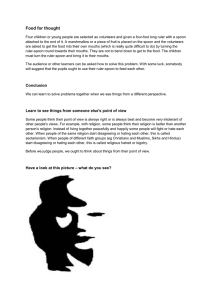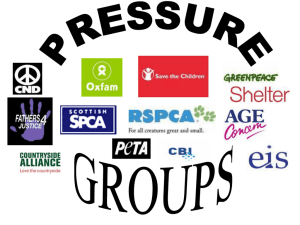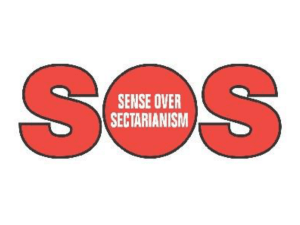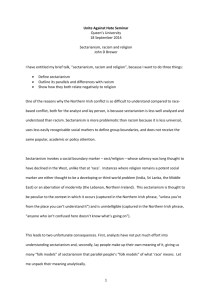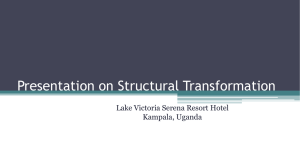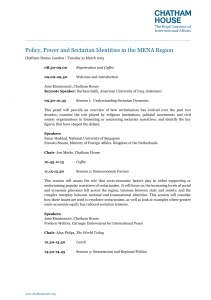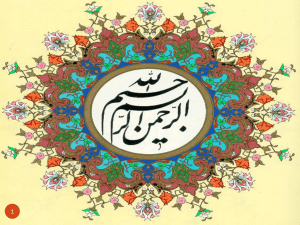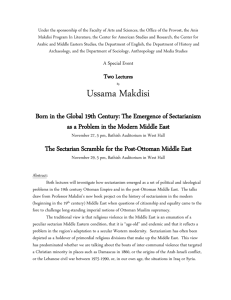Disclaimer: This learning journey was originally created as part of the... programme. Although the original purpose was to support learning...
advertisement
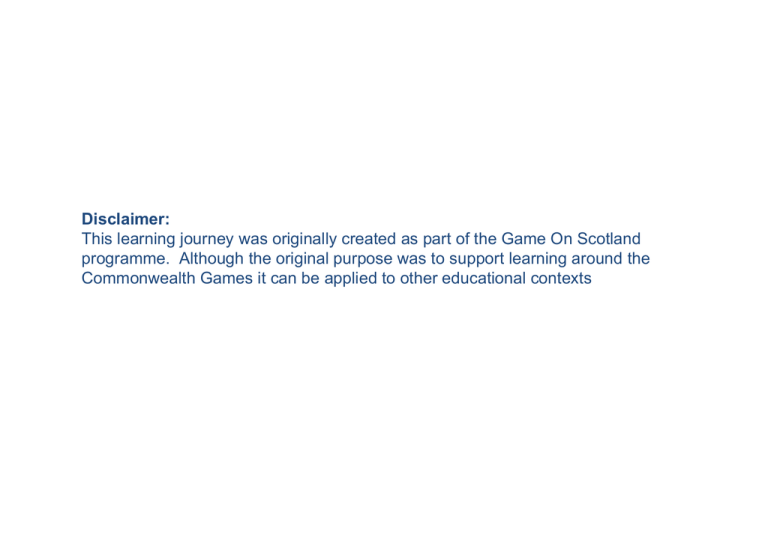
Disclaimer: This learning journey was originally created as part of the Game On Scotland programme. Although the original purpose was to support learning around the Commonwealth Games it can be applied to other educational contexts Learning journey – Sectarianism in Scotland and globally Focus: Gaelic, Social studies, Health and wellbeing CfE Level: Fourth Introduction: This learning journey looks at the issue of sectarianism in Scotland and Northern Ireland whilst drawing on comparisons to other Commonwealth countries affected by conflicts, in particular tribal conflict. The learning journey focuses on using Gaelic as the medium and uses the issue of sectarianism as the stimulus for learning. It explores the background and history to sectarian issues in Scotland and gives learners the opportunity to draw comparisons between the behaviours and actions associated with both tribal conflict and sectarianism. Although the learning journey is focused for Gaelic speakers this learning journey can be applied easily to non-Gaelic learners. Pport learne rs to draw compar is ons between tribalis ms This learning journey contains the following learning experiences: • Sectarianism in Scotland • Shared experiences - conflict in the Commonwealth • How can we make a difference? Prior learning: Interdisciplinary opportunities: Capabilities: Learners might have been introduced to issues surrounding territorialism, sectarianism or ways in which we are divisive in our communities from personal experience e.g. community, home, peers. Learners may also have participated in previous lessons or wider school initiatives. To contextualise learners' understanding, practitioners may wish to consider looking at different aspects of territorialism, sectarianism, gang culture E.g. historical sectarianism, football allegiance, geographical tensions. The learning experiences will open opportunities across literacy and Gaelic, across Social Studies, in addition to RME, Health and Wellbeing. Interdisciplinary topics might include: Successful learners – use literacy and research skills to gather and evaluate information on sectarianism in Scotland. Confident individuals – gain sound knowledge of sectarianism and an understanding of the issue at home and abroad, Responsible citizens – can make decisions to take action to bring about equality. Awareness of Scotland’s commitment to tackle sectarianism will increase their sense of citizenship. Effective contributors – contribute to the research and class discussion as well as contribute to the wider discussion across schools and countries. www.gameonscotland.org • How do we create our identity? • How do we tackle conflict in our community? 1 Learning journey – Sectarianism in Scotland and globally Focus: Gaelic, Social studies, Health and wellbeing CfE Level: Fourth Relevant Experiences and Outcomes: Social Studies: • • • • By studying groups in past societies who experienced inequality, I can explain the reasons for the inequality and evaluate how groups or individuals addressed it. SOC 4-04a I can describe the main features of conflicting world belief systems in the past and can present informed views on the consequences of such conflict for societies then and since. SOC 4-04b I have developed a sense of my heritage and identity as a British, European or global citizen and can present arguments about the importance of respecting the heritage and identity of others. SOC 4-02a I have investigated a meeting of cultures in the past and can analyse the impact on the societies involved. SOC 4-05c Gaelic (Learners): • • • • • I can collaborate to prepare and present in Gaelic more open-ended role plays in a wide range of realistic settings, and I can engage with other speakers of Gaelic. LGL 4-05a I can write more extensively over a widening range of topics in a range of formats, using some variety of structures, tenses and linking words. LGL 4-12b I can write about experiences, feelings and opinions and can offer reasons for having these opinions. LGL 4-12c I can write about life or culture in countries where Gaelic and related languages are spoken. LGL 4-12a Using a variety of resources, I can independently read texts which are more detailed and which contain complex language, including a range of tenses and Gaelic idiom, and can demonstrate my understanding. LGL 4-08a Literacy and English: • • When I engage with others I can make a relevant contribution, ensure that everyone has an opportunity to contribute and encourage them to take account of others’ points of view or alternative solutions. I can respond in ways appropriate to my role, exploring and expanding on contributions to reflect on, clarify or adapt thinking. LIT 4-02a I can communicate in a clear, expressive manner when engaging with others within and beyond my place of learning, and can independently select and organise appropriate resources as required. LIT 4-10a Health and Wellbeing- Mental, emotional, social and physical wellbeing: • • • I know that friendship, caring, sharing, fairness, equality and love are important in building positive relationships. As I develop and value relationships, I care and show respect for myself and others. HWB 4-05a As I explore the rights to which I and others are entitled, I am able to exercise these rights appropriately and accept the responsibilities that go with them. I show respect for the rights of others. HWB 4-09a Through contributing my views, time and talents, I play a part in bringing about positive change in my school and wider community. HWB 4-13a www.gameonscotland.org 2 Learning journey – Sectarianism in Scotland and globally Focus: Gaelic, Social studies, Health and wellbeing CfE Level: Fourth C Learning experience A: How do we identify ourselves in Scottish Society? Introduction: Possible learning opportunities / tasks Possible evidence We all identify ourselves in a variety ways. This may be by name, nationality, family connection. It is essential we all have an identity and a sense of belonging. Often this identity can be used to collude against and exclude others from the perceived group that you identify with. This can be done through gang affiliation, sectarian attitudes, territorial isolation, groups of ethnicity. Learners could: • Research different ways in which we identify ourselves in our society E.g. by class, religion, gender, location. Explore the positive and negatives of this. Positive: sense of belonging. Negative: elitism. • Research the history of sectarianism in Scotland as an example of the impacts of negative thoughts and actions connected to identification. • Pupils could produce evidence of their findings using the Gaelic language. • Research the changes in sectarianism in Scottish Society. Learners could focus on changes in employment, legislation, attitudes and behaviour and their local community. Learners can: Communicate - Produce written materials in Gaelic/ English that shows an understanding of the history of Sectarianism in Scotland Make - Learners have produced a piece of work that can be shared with others to inform them of the issue of sectarianism in Scotland. Say - Learners are able to discuss sectarianism in the Scotland in the past and present in Gaelic/English Stimulus: Learners could be asked: How they identify themselves? Do they belong to particular groups? Are these groups exclusive e.g. membership only? Does this impact on others? Do they see divisive groups in their community, e.g. gangs, sectarianism, ethnicity? Does this affect their lives? Key learning Learners can: • understand what is meant by identity • understand concepts surrounding sectarianism, territorialism, tribalism • can draw from varied examples of sectarianism in society both historical and present and make comparison. E.g. employment, football, family life • can successfully identify examples of sectarianism in Scotland • can reflect on the impact sectarianism has on Scotland • can report the impacts of sectarianism in their local community www.gameonscotland.org Learners can also: produce information in Gaelic or English that can be shared with schools in the other countries they will be studying throughout the learning journey. Learners should give consideration to how they would display information, how they will collate the information as a collective group, what forms of information sharing will be engaging and interesting for others. E.g. art, written reports, film and media. Reflecting on learning: Questions for learners: • What are the differences/ impacts of sectarianism in modern society as opposed to historically? • What have you learned from the research into your local community, about the views and values of the local people and its role historically regarding sectarianism? • After researching sectarianism in Scotland how do you think the issue reflects on Scotland as a country as you as individuals, does it resonate with territorialism or tribalism? Taking it further • Useful resources http://www.actiononsectarianism.info http://www.educationscotland.gov.uk/supportinglearn ers/positivelearningenvironments/inclusionandequalit y/challengingsectarianism/index.asp http://www.scotland.gov.uk/Resource/0044/0044038 6.pdf http://www.nilbymouth.org 3 • Tackling the issue of sectarianism in school and local community by looking at local initiatives, or taking action in school. The opening ceremony for the Commonwealth Games was held at Celtic Park. Learners could look into the local opinions surrounding this and if any opinions have been impacted by sectarian attitudes. Learning journey – Sectarianism in Scotland and globally Focus: Gaelic, Social studies, Health and wellbeing CfE Level: Fourth Learning experience B: Shared Experiences- conflict in the Commonwealth Possible learning opportunities / tasks Possible evidence Learners can: Communicate - use the Gaelic language to produce information on sectarianism across the commonwealth Produce - information regarding sectarianism across the commonwealth that can be shared with others. Say - reflect as a group on their feelings regarding sectarianism and the impact it has on theirs and others lives Ask: What do you know about Northern Ireland and sectarianism? Are there other countries where we see sectarianism? Is there other religions that are affected by sectarian divides? Learners could: • Research the history of sectarianism in Northern Ireland. Learners can focus on the religious, political and geographical history of sectarianism. Learners can also make links to the history of sectarianism in Scotland. • Investigate and compare sectarianism in Scotland and Northern Ireland in modern society. This could be done using research or an exchange of information if working with NI schools or schools from Rwanda. • Research and report on sectarianism or tribal conflict in other commonwealth countries such as the example given of Rwanda. Learners could look at the wider context of a divisive conflict and then focus on individual incidents and the impact on day to day life. Key learning Useful resources Learners can: • Discuss the impacts sectarianism has on a country and the communities within it. • Identify comparisons between sectarianism in Scotland and other countries. • Select information to produce thoughtful pieces of work which demonstrate an understanding of sectarian issues in Scotland and other countries. • Identify different ways in which sectarianism manifests itself. E.g. a social, economic, religious or cultural issue. http://www.communityrelations.org.uk/resources/what-is-sectarianism/ http://www.bbc.co.uk/news/world-middle-east16047709 http://www.bbc.co.uk/northernireland/learning/eyewit ness/sectarian/index.shtml http://www.bbc.co.uk/history/troubles http://www.globalissues.org/article/429/rwanda http://www.bbc.co.uk/news/world-africa-13431486 http://www.rwanda-genocide.org/ http://www.rwandanstories.org/genocide.html Introduction: Sectarianism is experienced in different countries and manifests itself in different ways. The issue of sectarianism is evident in Northern Ireland. This learning experience will allow learners to draw comparisons and identify differences in sectarian attitudes and behaviours geographically. Sectarianism can be mirrored in tribal conflicts such as with the conflict in Rwanda between the Tutsi and the Hutu tribes. Learners with have the opportunity to draw comparisons in behaviour and reflect on this in relation to their own community. Stimulus: www.gameonscotland.org 4 Reflecting on learning Questions for learners: • What have been the developments in reducing sectarianism and tribal conflict across the Commonwealth? • Do you feel there is still a big issue with sectarianism in Scotland and other countries? • Do you feel others are affected by sectarianism in a different way from you? • How do you feel about the links in behaviour between sectarianism and tribalism? Taking it further • • Learners can contact other groups and schools from countries they have studied to share experiences. Learners could hold peer learning events to share their findings with others. Learning journey – Sectarianism in Scotland and globally Focus: Gaelic, Social studies, Health and wellbeing CfE Level: Fourth Learning experience C: How can we make a difference? Introduction: Possible learning opportunities / tasks Possible evidence The first two learning experiences allows learners the opportunities to learn about the history, impacts and draw comparisons regarding sectarianism in different countries. As responsible citizens this learning experience allows learners the opportunity to explore ways in which they can tackle sectarianism. Learners could: • Use the Equality Act 2010 to understand the responsibility of all to tackle in equalities, and specifically look at sectarianism. • Identify key recommendations from the Advisory Group for tackling sectarianism and identify where they feel change needs to occur to tackle sectarianism, and where they can take responsibility for impacting change. • Take positive actions to tackling sectarianism. This could include looking at sectarianism in the local community, national letter writing campaign or looking at how they can raise awareness of international issues across the commonwealth. • Using the Gaelic language, learners could produce awareness raising materials that are relevant to the Gaelic community. • Adopt models from other countries such as Rwanda and Northern Ireland for addressing conflict in the community. Learners can: Communicate - discuss in Gaelic/English their ideas for creating change Make - produce materials in Gaelic/English to raise awareness of sectarian issues and how to tackle them. Do - take action to tackle sectarianism in their local community or school using different and effective methods. Stimulus: Who is responsible for tackling sectarianism? Could more be done to tackle sectarianism? What are the consequences for those involved in sectarian behaviour? Do you agree with the consequences? How would you tackle sectarianism? Key learning Learners can: • Discuss the Equality Act 2010 and can look at how it relates to sectarianism • Identify key recommendation from the Advisory Group on tackling sectarianism in Scotland report, and relate them to their own responsibilities. • Identify ways in which they can have an impact on tackling sectarianism in their community and wider society. • Confidently share their findings to educate others on how to tackle sectarianism. www.gameonscotland.org Reflecting on learning: Questions for Learners: • What impact can we have on society as individuals and as groups? • Are there other areas of inequality in our community? • What social issues affect us and what can we do to change them? Taking it further Useful resources http://www.scotland.gov.uk/Publications/2013/12/6197 http://www.legislation.gov.uk/ukpga/2010/15/contents https://www.actiononsectarianism.info/ http://www.youthworkessentials.org/stand-up-tosectarianism/news/local-action/school-responses.aspx http://www.educationscotland.gov.uk/supportinglearners/ positivelearningenvironments/inclusionandequality/index. asp http://www.interpeace.org/programmes/rwanda http://nicekids.org/ 5 Learners can • Establish an anti-sectarian action group in school • examine equality issues in other Commonwealth countries • organise an exchange trip to NI schools/ organisations to understand what they are doing to tackle sectarianism and apply the knowledge at home. • embark on a letter writing campaign
